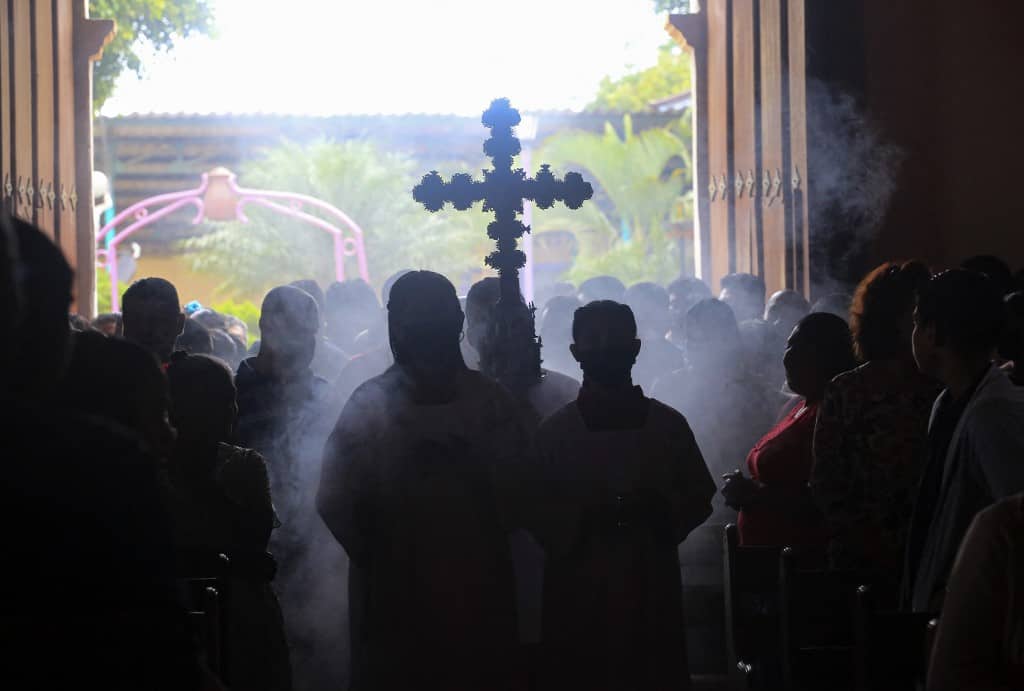At least thirteen priests have been arrested since December 20 in Nicaragua, including a bishop, amid strong tensions between the Catholic Church and Daniel Ortega’s government, according to human rights activists, opponents and Nicaraguan media outlets in exile.
Among those detained are Monsignors Silvio Fonseca, family vicar of the Archdiocese of Managua; Miguel Mántica, of the San Francisco church, also in the capital; and Marcos Díaz, of the diocese of León (northwest), according to these sources.
Also arrested were priests Gerardo Rodríguez, Mykel Monterrey and Raúl Zamora, who provide religious services in churches in Managua, Nicaraguan media outlets edited in Costa Rica reported.
These arrests are in addition to those of Bishop Isidoro Mora and two seminarians on December 20, which were followed in the past week by the arrests of Managua’s vicar general Carlos Avilés and priests Héctor Treminio, Fernando Calero and Pablo Villafranca.
Eleven of those arrested appear on a list provided by lawyer Martha Molina, an expert on Nicaraguan church issues, exiled in the United States. The newspaper La Prensa added among those arrested priest Jader Hernández, pastor of a church in Managua.
On Saturday night, Molina said on the X social network that another Managua religious, Monsignor Ismael Serrano, had been arrested that same day and that he was “a too sick priest.”
Nicaraguan human rights activist Bianca Jagger urged Pope Francis’ support for priests in the face of “relentless persecution” and a “fierce” witch hunt against the Church in Nicaragua on X. “Do not abandon them, they are in danger and need you SOS,” she wrote.
Neither the Nicaraguan government nor the police have referred to the allegations. Last Wednesday, Vice President and wife of Daniel Ortega, Rosario Murillo, called “devils” the religious who, according to her, sow “hatred” in the country.
Fierce witch hunt
Bishop Silvio Báez, who left Nicaragua in 2019, denounced the “persecution” against the Church and called for the solidarity of bishops around the world and the international community.
“They are not prisoners or criminals but men of God (…); we are proud of them and we will be with them in prayer until we achieve their freedom and that of all political prisoners,” Báez said in a video on social media.
“We ask the international community to be more effective in pressuring the Sandinista dictatorship of Ortega, to demand the release of all political prisoners,” the bishop added, hours after denouncing on X “a fierce witch hunt” against religious figures.
Báez asked the bishops’ conferences of the world not to “abandon” the Church in Nicaragua, to “show solidarity and raise their voices denouncing this persecution by the dictatorship.”
Salvadoran-Spanish José María Tojeira, spokesman for the Jesuits in Central America, said on X that the “persecutors” of the Church always end up failing. “By beating the Church they do nothing but dig their own destruction,” he said. The Jesuit order was closed in August in Nicaragua and its university confiscated by the government.
Media such as La Prensa, Confidencial and 100% Noticias, edited in Costa Rica, cited in their complaint ecclesiastical sources, lawyers Molina and Yonarqui Martínez and human rights activist Haydée Castillo, all in exile.
Forced disappearance
The Office of the United Nations High Commissioner for Human Rights condemned on Thursday the “forced disappearance” of Bishop Mora and the “new wave of arrests of religious figures” in Nicaragua. With Mora, 53, there are now two detained bishops.
Rolando Álvarez, 57, was sentenced on February 10 to 26 years for treason against the homeland, spreading fake news and contempt, a day after he refused to leave for the United States along with 222 jailed opponents.
Álvarez has preferred jail to exile and was not among the 12 priests released in October and sent to Rome after an agreement between the government and the Vatican.
The relationship between the Church and the government deteriorated amid the 2018 protests, after Ortega accused religious leaders of supporting opponents in what he considered an attempted coup d’état. The protests left more than 300 dead, according to UN data.
A Molina investigation maintains that since 2018 there have been 740 attacks against the Church and that 176 priests and nuns were expelled, banished or prohibited from entering the country.






